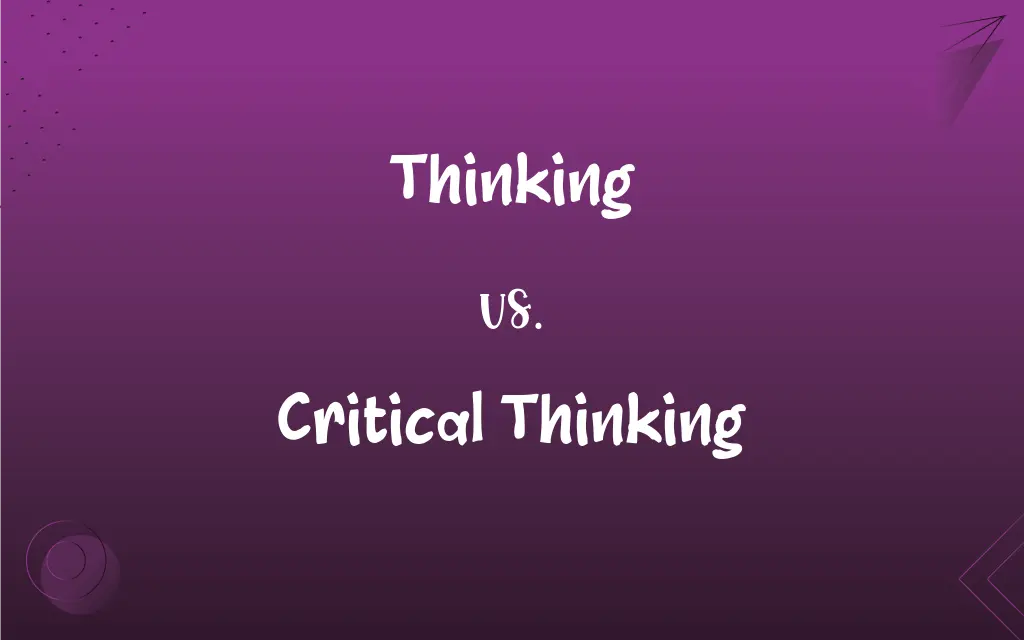Thinking vs. Critical Thinking: What's the Difference?
Edited by Aimie Carlson || By Harlon Moss || Published on November 28, 2023
Thinking is the general process of forming thoughts and ideas. Critical thinking involves analyzing and evaluating information for reasoned judgment.

Key Differences
Thinking is a broad, general process encompassing all types of mental activities, such as remembering, fantasizing, or planning. Critical thinking, however, is a specific kind of thought process that involves logical reasoning, identifying biases, evaluating evidence, and making reasoned judgments.
General thinking is used for everyday problem-solving, creativity, and day-to-day decision making. Critical thinking is used in more complex situations where careful analysis and evaluation of information and arguments are required.
While thinking can be spontaneous and intuitive, critical thinking requires a deliberate, systematic approach. It involves skills such as analysis, evaluation, inference, and interpretation.
The outcome of general thinking might be an idea, a belief, or a plan. The outcome of critical thinking is often a well-reasoned judgment or decision, especially useful in academic, professional, and personal situations where complex problems need to be solved.
While thinking is a natural mental process, critical thinking skills can be developed and enhanced through education and practice. It involves learning specific strategies to approach problems methodically and logically.
ADVERTISEMENT
Comparison Chart
Definition
General process of forming thoughts and ideas.
Analyzing and evaluating information for judgment.
Purpose
Used for everyday problem-solving and decision-making.
Applied in complex situations requiring deep analysis.
Process
Can be spontaneous and intuitive.
Systematic, involving logical reasoning and evaluation.
Outcome
Results in ideas, beliefs, plans.
Leads to well-reasoned judgments and decisions.
Development
Natural mental process.
Skills enhanced through education and practice.
ADVERTISEMENT
Thinking and Critical Thinking Definitions
Thinking
Engaging in a process of considering or reasoning.
She spent the afternoon thinking about her future plans.
Critical Thinking
Assessing the validity of information.
His critical thinking led him to question the reliability of the source.
Thinking
Formulating a plan or strategy in mind.
They were thinking about the best route for their road trip.
Critical Thinking
Methodically evaluating arguments or propositions.
Through critical thinking, she identified flaws in the argument.
Thinking
Using thoughts to resolve a problem.
He was thinking of ways to fix the leak in the roof.
Critical Thinking
Solving complex problems through analysis.
Critical thinking helped them develop a viable solution.
Thinking
Generating ideas and concepts.
She was thinking of new designs for her art project.
Critical Thinking
Making decisions based on logic and reasoning.
Her critical thinking resulted in a well-informed decision.
Thinking
Contemplating or pondering over a topic.
He was thinking about the advice his mentor gave him.
Critical Thinking
Recognizing subjective influences.
By critical thinking, he could see the bias in the report.
Thinking
The act or practice of one that thinks; thought.
Thinking
A way of reasoning; judgment
To my thinking, this is not a good idea.
FAQs
Can everyone think critically?
While everyone can think, critical thinking is a skill that can be developed and improved.
How does thinking differ from critical thinking in decision-making?
General thinking might be based on intuition, while critical thinking relies on logical analysis.
What is thinking?
The process of forming thoughts, ideas, or plans in the mind.
How does critical thinking help in academics?
It enhances comprehension, argumentation, and research skills.
How can one improve critical thinking skills?
Through practice, education, and engaging in activities that challenge reasoning and analysis.
Is thinking emotional?
Thinking can involve emotions, but critical thinking requires minimizing emotional influence for objectivity.
Are there tools to help with critical thinking?
Yes, there are various methodologies and frameworks like the scientific method or SWOT analysis.
What is critical thinking?
The process of analyzing and evaluating information to form a reasoned judgment.
Why is critical thinking important?
It helps in making informed, logical decisions and understanding complex issues.
Can thinking be trained?
While natural, thinking can be enhanced through various cognitive exercises and learning.
Do thinking habits affect critical thinking?
Yes, habitual ways of thinking can influence one's approach to critical thinking.
Can critical thinking be biased?
Ideally, it shouldn't be, but personal biases can sometimes influence it.
Is critical thinking essential in leadership?
Yes, it's crucial for making strategic decisions and solving complex problems.
How does culture affect thinking?
Cultural background can influence one’s perspective and style of thinking.
Is critical thinking always objective?
It aims to be objective, though complete objectivity is challenging to achieve.
Does age impact critical thinking ability?
Age can influence experience and knowledge, which can affect critical thinking.
Can critical thinking lead to creativity?
Yes, it can provide new insights and innovative solutions.
Does thinking always lead to a conclusion?
Not always; sometimes it's an ongoing process.
Is there a difference in thinking between experts and novices?
Experts tend to think more deeply and critically in their field of expertise.
Can technology enhance thinking skills?
Certain technologies, like educational software, can aid in developing thinking skills.
About Author
Written by
Harlon MossHarlon is a seasoned quality moderator and accomplished content writer for Difference Wiki. An alumnus of the prestigious University of California, he earned his degree in Computer Science. Leveraging his academic background, Harlon brings a meticulous and informed perspective to his work, ensuring content accuracy and excellence.
Edited by
Aimie CarlsonAimie Carlson, holding a master's degree in English literature, is a fervent English language enthusiast. She lends her writing talents to Difference Wiki, a prominent website that specializes in comparisons, offering readers insightful analyses that both captivate and inform.






































































